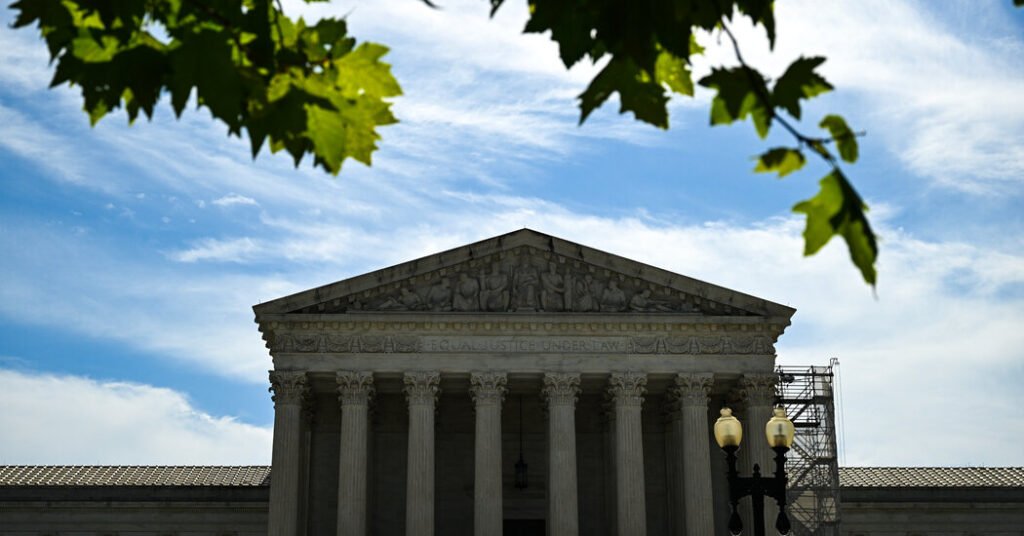For years, liberal Democrats have agitated for america to tax wealth, not simply revenue, as a means to make sure that wealthy Individuals who derive wealth from actual property, shares, bonds and different property have been paying extra in taxes.
On Thursday, that dream survived a Supreme Courtroom scare, however simply barely.
Because of a slender courtroom ruling, a raft of plans to make use of the tax code to deal with the gaping divide between the very richest Individuals and everybody else seem set to stay for years to come back within the marketing campaign proposals and official budgets of prime Democrats.
The thought of a wealth tax was circuitously earlier than the courtroom on Thursday. Justices have been contemplating the constitutionality of a brand new tax imposed below former President Donald J. Trump that applies to sure revenue earned by companies abroad. However in taking the case, the courtroom may have pre-emptively dominated federal wealth taxation unconstitutional.
It didn’t, and liberal teams celebrated the victory.
“The Supreme Courtroom additionally may have taken an activist flip of the worst sort by pre-emptively ruling federal wealth taxes unconstitutional right this moment,” Amy Hanauer, the manager director of the Institute on Taxation and Financial Coverage, which helps larger taxes on companies and the rich, mentioned in a press release. “To its credit score, the courtroom didn’t achieve this.”
However the case additionally supplied a window into the authorized struggle to come back over varied iterations of a wealth tax ought to Congress ever undertake one. It confirmed a strong 4 justices firmly against such a tax — and two extra who appeared skeptical.
“This can be a slender choice,” Joe Bishop-Henchman, the vice chairman of the Nationwide Taxpayers Union, which opposes wealth tax proposals, mentioned in a press release on Thursday. However, he added, “the courtroom makes clear it’s not opening the door to a wealth tax.”
The ruling in the case on Thursday was nominally concerning the constitutionality of a tax included within the tax overhaul Mr. Trump signed into legislation in 2017. The justices upheld the measure in a 7-to-2 vote.
The larger debate across the choice, which performed out throughout 83 pages of writings from a number of justices, was whether or not Congress has the facility to impose taxes on wealth.
President Biden and different main Democrats have pledged to pay for sweeping new spending packages, like expanded well being protection or common paid depart, partly by taxing the online price of a number of the wealthiest individuals in America. They’d transcend conventional authorities efforts to tax revenue from work or investments, and as an alternative make multimillionaires pay taxes on the positive aspects their portfolios accrue on paper.
Many conservatives have argued these plans violate the Structure’s limits on what kind of taxes the federal authorities can impose. Some teams had urged the courtroom to aspect with that argument, pre-emptively declaring wealth taxes off limits to lawmakers.
The problem largely comes right down to what counts as “revenue.” Is it cash that reveals up in somebody’s checking account, like from a paycheck or a inventory sale? Or so-called unrealized positive aspects from property rising extra priceless over time, even when they aren’t bought?
4 conservative justices wrote on Thursday, in concurring or dissenting opinions, that unrealized positive aspects don’t depend as revenue — hinting that, by extension, wealth taxes are a no-go. That’s practically a majority, and it was sufficient to alarm supporters of a wealth tax.
“It’s now evident that 4 Supreme Courtroom justices are enthralled by the affect of billionaires,” Morris Pearl, the chief of Patriotic Millionaires, a bunch that helps larger taxes on the wealthy, wrote in a launch.
However the ruling additionally confirmed a path for a wealth tax, albeit a slender one. Justice Ketanji Brown Jackson, one of many courtroom’s liberals, wrote what’s principally a blueprint for presidency attorneys to defend a possible wealth tax earlier than the courtroom and a authorized concept that justices may comply with to uphold it.
She raised doubts over whether or not the Structure requires revenue to be realized with a purpose to move muster for federal taxation and mentioned the courtroom ought to play a “restricted” function in tax debates.
She urged justices to permit the dispute to be resolved by the general public, maybe understanding that wealth taxes are likely to ballot properly.
Two different liberal justices are more likely to aspect with Justice Jackson if such a case ever reaches the courtroom. That leaves a pair of conservatives because the probably swing votes: Chief Justice John G. Roberts Jr. and Justice Brett M. Kavanaugh, who wrote the courtroom’s majority opinion on Thursday. That opinion was peppered with references to what may or won’t depend as “realized” revenue for tax functions, however it explicitly refused to take a stance on future wealth tax questions.
“These are potential points for an additional day,” Justice Kavanaugh wrote, “and we don’t deal with or resolve any of these points right here.”
